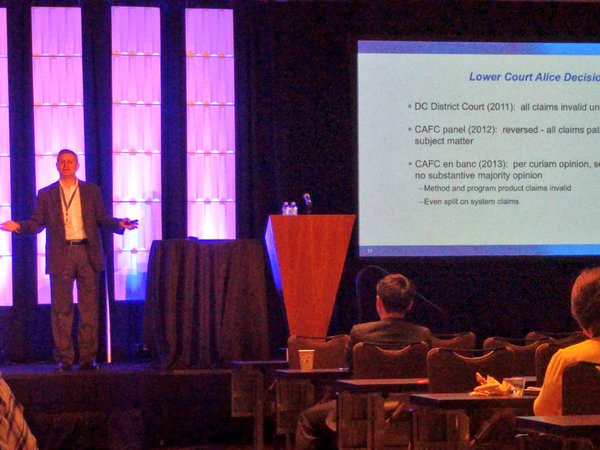

Photo credit: Esteban Minero
WHEN the announcement/proclamation of the prospective acquisition of Red Hat was first announced we were cautiously optimistic (it soon turned out that Red Hat had considered selling itself to Microsoft). We were hopeful that IBM would change course, but seeing the latest Patent Trial and Appeal Board (PTAB) inter partes reviews (IPRs) and patent lawsuits in district courts and the Federal Circuit it seems clear that IBM continues gaming the U.S. Patent and Trademark Office (USPTO), lobbying politicians for software patents and so on. They even recruited the former Director of the Office as a lobbyist (David Kappos). We're going to have to become more vocal given IBM's continued lobbying for software patents and ongoing bullying with patents on algorithms, even against small entities like online shops/retailers (as the latest IPRs reveal). They're extorting legitimate businesses using likely illegitmate patents, knowing the cost of invalidating these patents may be too great for these businesses (they might choose to settle, instead). What is going on at the top (management) of IBM? It's like they don't give a damn whether Red Hat is becoming a part of them. What is Red Hat's reaction? So far silence. I asked a few prominent employees, who prefer not to comment (maybe fear of losing their job). I know some people from Red Hat who follow me online; not even one tried to comment/explain/excuse IBM's behaviour when it comes to this. It's all silence.
"IBM's patent policy is extremely incompatible with Red Hat's."IBM has been lobbying for abstract patents even in Europe, where software patents aren't generally allowed (European Patent Office (EPO) President António Campinos does not care what the law says, however, as he's just another Battistelli with extra secrecy).
At the turn of the new year, seeing that the founder of Watchtroll (Gene Quinn) stepped down as chief editor after 2 decades, we said we would not link to Watchtroll anymore (sending it traffic), not even to rebut its torrent of nonsense. Looking at the latest articles, however, we continue to see more nonsense. "Winning Strategies for Getting Past the Five Types of Patent Examiner" is the title of a new post from Watchtroll. They view examiners as enemies who need to be undermined or fooled/manipulated. How revealing. How anti-scientific of them. Another new post from Watchtroll says "Canada Patent Law Changes Are Bad News for Patent Owners"; by that it means Canada does the right thing and more parasitic lawyers would be out of a job and would likely need a career change.
"Unless the Board of IBM flushed them and replaces them with more Red Hat-like mentality, Red Hat will generally be part of the problem, part of the threat to software development and perhaps to GNU/Linux at large."Gene Quinn of Watchtroll has just made it abundantly clear, once again, that IBM has not changed because in "IBM Calls for an End to the ‘Legal Fiction’ of Current 101 Law" we're seeing not even a mild difference/deviation from the old agenda. The outline says: "This marks the final installment in my four-part interview with IBM’s Vice President and Assistant General Counsel Mark Ringes and Chief Patent Counsel Manny Schecter. I found our conversation fascinating and want to thank them both again for their time and insight. Below, we conclude with an in-depth discussion on how the U.S. patent system is affecting startups and the state of enforceability following Director Iancu’s Section 101 Guidance."
So these are the people at the top of IBM. Unless the Board of IBM flushes them down and replaces them with more Red Hat-like mentality, Red Hat will generally be part of the problem, part of the threat to software development and perhaps to GNU/Linux at large.
"Stupid Patent of the Month" has just been published by Joe Mullin, who joined the EFF about a year ago after he had covered patent trolls a great deal in the media (and he did a good job, unlike the loads of stenography from law firms that dominate patent coverage). Some hours ago he published this post:
In the smartphone era, “distracted driving” is a serious, and well-known, problem. Official warnings about poor driving habits are as old as the automobile itself. The New York Times published a Pulitzer-winning series on distracted driving back in 2009.
Increasingly, technological assists are available for those seeking to manage their smartphone’s distractions while in the car. Apple integrated a “do not disturb while driving” mode into iOS 11, and Google has long had similar functionality in its Android Auto app. Multitudes of third-party smartphone apps exists to address the issue. Finally, more than 50 companies are working on what may be the ultimate solution to distracted driving: autonomous vehicles.
Unfortunately, the U.S. patent system creates warped incentives for emerging software fields like road-safety features. Rather than competing in a challenging space, some players are seeking broadly-worded patents, then hope to sit back and extract profits later.
That may be the strategy of the International Business Machine Corp., which has acquired more U.S. patents than any other company for decades now. This week, IBM was awarded U.S. Patent No. 10,191,462, describing a “Vehicle electronic receptionist.”